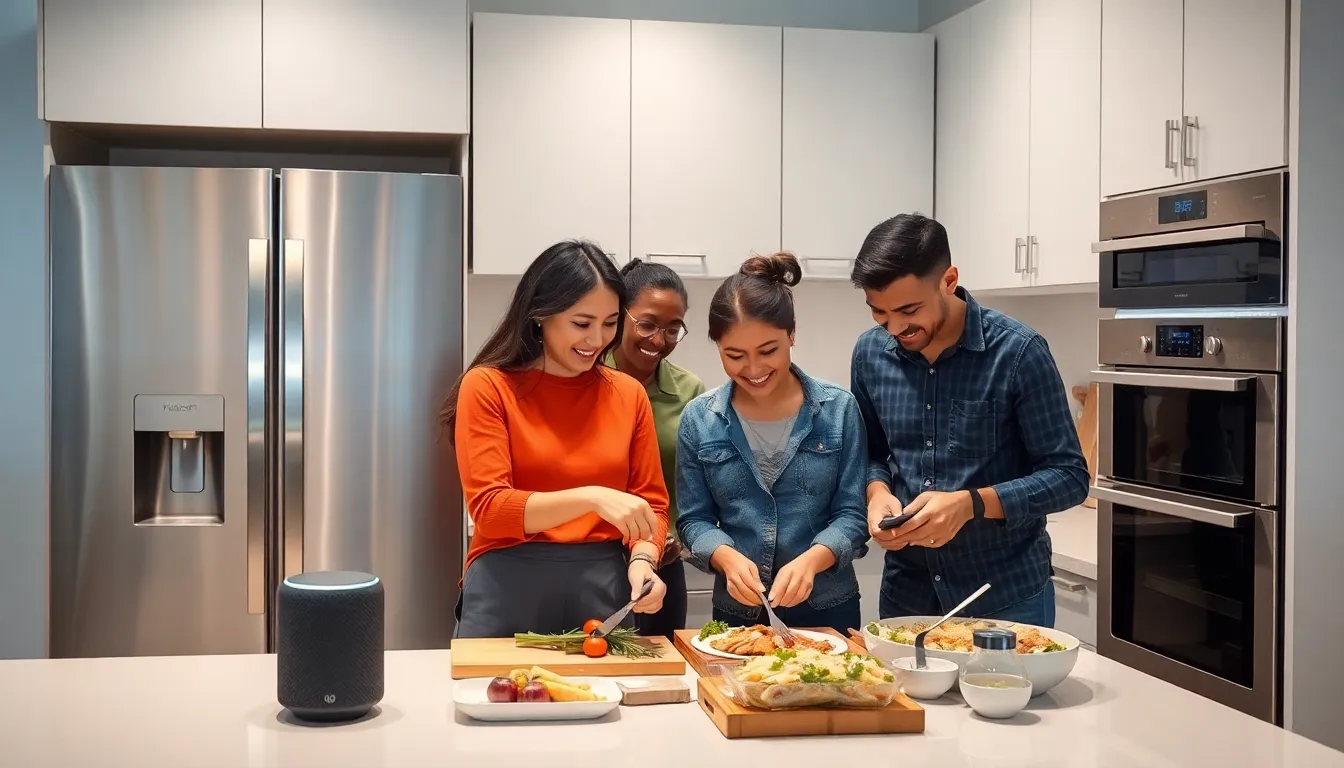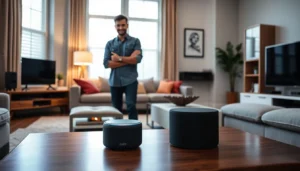Table of Contents
ToggleImagine a kitchen where your fridge knows your grocery list better than you do and your oven can preheat itself while you’re still in bed. Welcome to the world of the connected kitchen, where technology whisks away the mundane and transforms cooking into a delightful experience.
Gone are the days of burnt toast and forgotten leftovers. With smart appliances at your fingertips, meal prep becomes a breeze, and even your recipes can be customized to suit your taste buds. It’s like having a personal sous-chef who never complains and always shows up on time.
Overview of Connected Kitchen
Connected kitchens incorporate smart technology to revolutionize meal preparation. Smart appliances streamline cooking tasks, making daily routines more efficient. For instance, refrigerators equipped with inventory management systems notify users when supplies are low or nearing expiration.
Ovens with integrated Wi-Fi capabilities allow remote preheating, ensuring meals are always ready when needed. Additionally, smart speakers assist with voice-activated recipes, enabling hands-free cooking experiences. Cooktops that monitor temperature and adjust settings automatically prevent common issues, such as overcooking and burnt dishes.
Connectivity plays a vital role in enhancing the kitchen experience. Users can access recipes from multiple sources, combining personal preferences with dietary needs. Recipe applications synchronize with smart appliances, automatically adjusting cooking times and temperatures for optimal results.
Meal planning apps extend the connected kitchen’s functionality by generating grocery lists based on selected recipes. These tools save time and reduce food waste by ensuring that necessary ingredients are on hand when cooking. Moreover, connected kitchens integrate with home ecosystems, facilitating seamless communication among devices.
Security features in connected kitchens also contribute to peace of mind. Cameras embedded in refrigerators allow users to check inventory while grocery shopping, decreasing the likelihood of missing essential items. Integration with smart home systems enables alerts for unusual activity or potential hazards.
Connected kitchens embody innovation by transforming traditional cooking into an engaging, efficient process. These advancements not only simplify meal preparation but also foster creativity and exploration in culinary endeavors.
Benefits of a Connected Kitchen

Connected kitchens bring numerous advantages, elevating the cooking experience through technology.
Increased Efficiency
Smart appliances streamline cooking tasks, making meal preparation faster. Refrigerators with inventory management systems help users stay informed about available ingredients. Cooking becomes more efficient with ovens that can preheat remotely, allowing for multitasking. Energy-efficient devices can also reduce utility costs. Meal planning apps generate grocery lists based on recipes, saving valuable shopping time. Users can seamlessly manage their cooking timelines without distractions. Automation ensures that ingredients are always fresh and accessible, contributing to an organized kitchen environment.
Enhanced Convenience
Connected kitchens improve convenience in everyday cooking. Voice-activated smart speakers offer hands-free assistance for quick recipe access. Users can control appliances remotely, ensuring everything is ready upon arrival home. Alerts for low supply levels help prevent last-minute grocery trips. Cameras in refrigerators allow users to check inventory from the store, ensuring they don’t miss essential items. Meal preparation becomes less stressful, and users enjoy more time engaging with family and friends. Overall, the convenience of connected kitchens promotes a pleasurable cooking atmosphere.
Key Features of Connected Kitchen Devices
Connected kitchen devices offer a range of features that enhance cooking efficiency and functionality. Smart appliances and home automation integration play key roles in modern kitchens.
Smart Appliances
Smart appliances significantly enhance meal preparation. Refrigerators equipped with inventory management alert users about low stock or nearing expiration dates. Ovens with Wi-Fi capabilities allow users to preheat remotely, ensuring cooking readiness on arrival. Smart speakers provide voice-activated recipe guidance, promoting a hands-free cooking experience. Additionally, cooktops that monitor temperature help prevent overcooking, making each dish a success.
Home Automation Integration
Home automation integration maximizes convenience in the connected kitchen. Users can sync their smart devices for seamless operation, streamlining meal preparation. Apps enable meal planning and grocery list generation based on selected recipes, saving time. Notifications about low supply levels connect users to their kitchen needs instantly. Utilizing security features like refrigerator cameras fosters a stress-free shopping experience by confirming inventory on the spot. Overall, such integration elevates the cooking experience into a cohesive and efficient process.
Popular Connected Kitchen Products
Connected kitchens feature innovative products that enhance cooking experiences. Users benefit from various smart appliances that improve efficiency and convenience.
Smart Refrigerators
Smart refrigerators actively manage food inventory through built-in sensors. These appliances alert users when items are low or nearing expiration, minimizing waste and simplifying shopping. Many models offer touchscreen displays that show recipes based on available ingredients. Wi-Fi connectivity allows users to access inventory remotely, making grocery shopping easier. Additionally, some refrigerators provide meal planning tools, enabling seamless organization and preparation of meals for busy households. Overall, smart refrigerators revolutionize grocery management, aiding in maintaining freshness and stock.
Voice-Activated Assistants
Voice-activated assistants make task management in the kitchen straightforward. These devices respond to spoken commands, allowing users to request recipes or set timers hands-free. Integration with smart appliances enhances kitchen operations, enabling seamless control over ovens and refrigerators. Many assistants feature compatibility with various cooking apps, simplifying the meal planning process. They also provide updates on timers or cooking temperatures, ensuring optimal results. With these digital helpers, users experience a more interactive and less stressful cooking environment.
Challenges to Consider
Connected kitchens offer numerous advantages, yet they come with challenges that users must consider. Addressing these issues ensures a smoother experience.
Security Concerns
Security concerns arise in connected kitchens due to the integration of internet-enabled devices. Hackers can potentially access personal data through unsecured networks. Smart appliances often store sensitive information, increasing the risk during a security breach. Regular software updates serve as a vital step in mitigating these threats. Users need to enable strong passwords and utilize encryption options. Furthermore, utilizing firewalls can strengthen network security, safeguarding appliances from unauthorized access.
Compatibility Issues
Compatibility issues often hinder the user experience within connected kitchens. Various manufacturers may produce appliances that do not seamlessly communicate, disrupting the intended convenience. Different smart home ecosystems may require specific applications and protocols for optimal functionality. Users can encounter limitations when attempting to integrate devices from various brands. Researching compatibility before purchasing appliances can alleviate some frustration. Prioritizing devices from companies known for interoperability often leads to smoother connections and better user satisfaction.
The connected kitchen represents a significant leap forward in culinary technology. By integrating smart appliances and automation, it transforms cooking into a more efficient and enjoyable experience. Users can effortlessly manage meal preparation while minimizing stress and reducing food waste.
As technology continues to evolve, the connected kitchen will likely become even more intuitive and user-friendly. Embracing these innovations not only enhances convenience but also encourages creativity in the kitchen. With the right tools and strategies, anyone can elevate their cooking experience and enjoy the many benefits of a connected kitchen.




